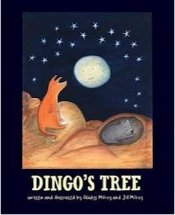Dingo's tree by Gladys Milroy and Jill Milroy

Magabala Books, 2011. ISBN: 9781921248436.
Highly recommended for ages 7 and up. When dingo wishes to escape
from the hot, summer sun, the other animals refuse to allow him to
share their shady trees. Instead, he draws a picture of a tree
boasting many branches, each covered in raindrops, on the rock
outside his cave. Dingo awakens to find that the tree has indeed
grown, tall and straight, directly up into the sky. To his
disappointment, however, it has no branches or leaves thereby
causing the animals to laugh at him. Over time, the land falls prey
to the drought and, whilst the other waterholes dry up, dingo's
continues to remain full. Unlike the other animals that have teased
dingo and failed to share, he kindly allows each of the other
creatures to drink from his waterhole. A cyclone occurs. As a
result, the waterholes are filled but dingo's tree disappears. As
the earth goes through additional seasons, the animals talk together
about their problems and the changes they notice. Crow adopts
'Little Tree' to keep watch over the raindrop it holds and life goes
on until even larger problems occur. Finally, when the rivers cease
to flow and the mountains are decimated, who will take care of the
environment? Will there be a happy ending?
Containing a sobering, cautionary tale about the environment and the
detrimental effects of man, this title would make a welcome addition
to the classroom library. It could be used as an introduction when
embarking on any study of the Australian environment. The
custodianship of the land and the responsibility of humans for our
native flora and fauna are highlighted in a confronting manner, yet
the bright and appealing illustrations make it acceptable to younger
children as well. Due to the substantial amount of text, this title
is perhaps better suited for middle primary students to read
independently but could certainly be read aloud to younger students.
This would be perfectly suited to my unit on drought and the
Australian landscape.
Jo Schenkel